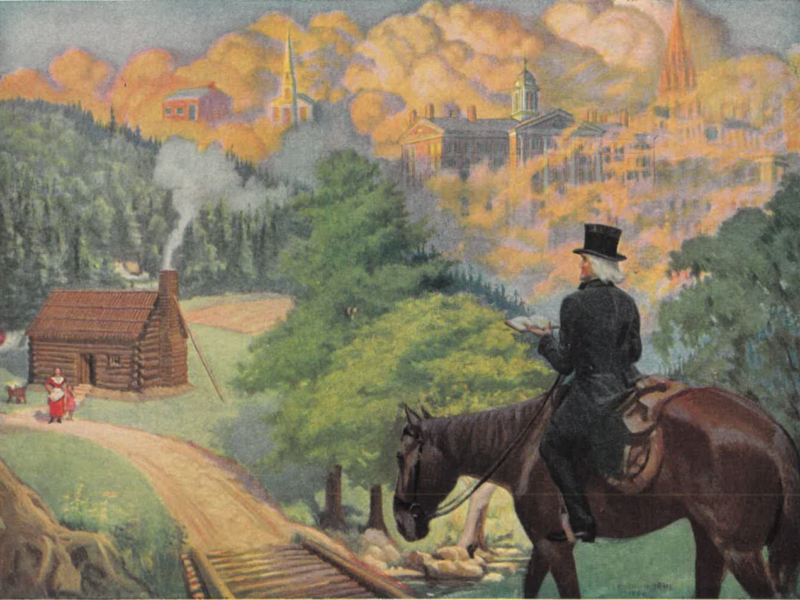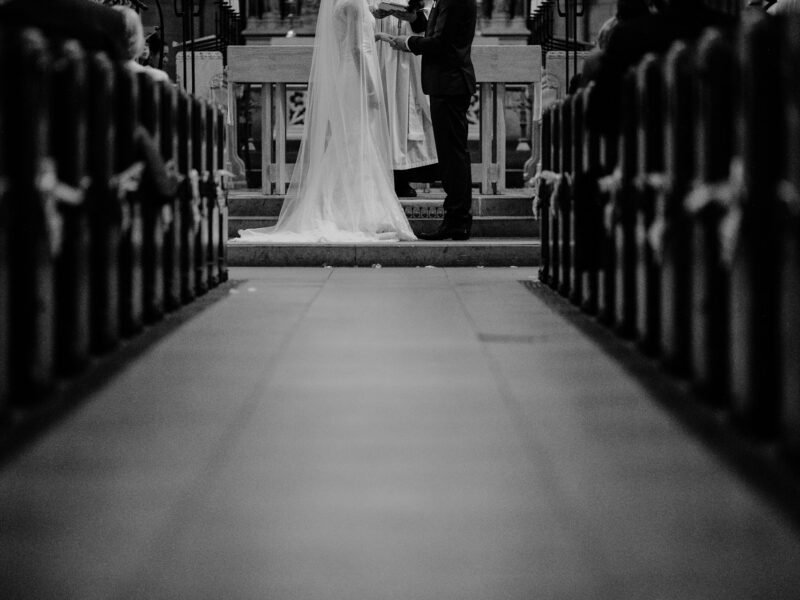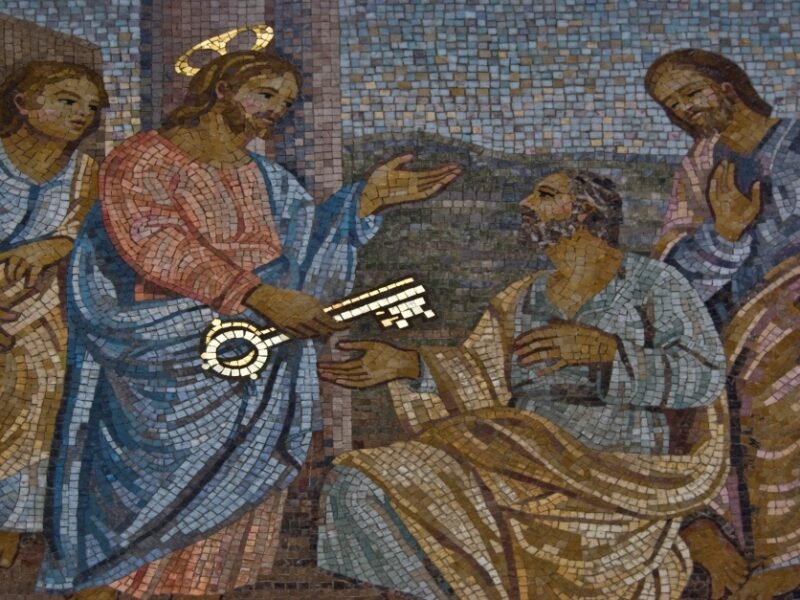Searching for Tradition
I remember entering ministry life and quickly being confused and discouraged. This discouragement wasn’t as a result of the normal pressures of ministry, burdens to bear, problems to navigate, etc. It had to do with the church service. It seemed like everything was so emotional. Music would extend on and on. The lyrics included sloppy wet kisses, proclaiming what we are doing for God, and the performance on stage. It seemed like expression was the goal of Christian maturity. And I was neither extroverted or very emotional, so I never walked the aisle or raised my hands nor bore my soul to people I barely knew. Do I belong here?
One can see this emotional emphasis in the Sean Feucht Worship Experience™. Here, singing is mission. Worship manifests God’s presence, and worship means singing and music. There were always worship nights in my evangelical culture growing up where praises were shouted, and songs were sung, and tears were shed. Revival happens in the experience of God, and the experience of God is found in music. But I always thought it was an odd thing that we always had worship nights but never preaching nights.
I longed for a more thoughtful, theologically rooted Christianity. And then I discovered the young, restless, and Reformed movement. In so many ways, it was refreshing: deep doctrine, intentional polity, long sermons. It was the intellectual weight needed in a culture filled with (what I thought was) emotional niceties. So, I read my theology books. I got advanced degrees. I honed my preaching skills. If Christian maturity was equal to theological precision, I had arrived.
For the longest time, I thought the church was centered around two things: the ministry of worship (which was song) and the ministry of the Word (which was the sermon). There were two steams of attraction that you had to get “up” for: the emotionality of worship and the headspace for the sermon. Each appealed to a certain constituency. A student recently said she was more of a worship person—that she didn’t get much out of sermons. I had another friend say that he usually arrived at the service after the singing—the sermon was the part he came for.
Search for Rootedness
In a talk about St. Augustine with Trinity Forum, James K.A. Smith speaks about the modern imaginary being something akin to swimming laps in an above ground pool. You get a few strokes in, and then hit the side. You keep bumping up against the railing. Frustrated by the limitations, you bowl down the sides as if that will lead to freedom. However, rather than freedom, you end up with no swimming pool. A previous generation saw limits like authority and concepts like submission and tore them down. Seeker sensitive churches removed the offensive elements of the church service. Who needs them anyway? But my generation came of age with no tradition and no limits. We didn’t have worship services. Now, we have worship experiences. And with the lack of tradition comes a lack of institutional wisdom and culture. I’ve grown to crave wisdom. I’m typically fine with people telling me what to do, because I don’t even have principles with which to order my wisdom. I felt lost and like I had no help. But they had truth.
The search for a past tradition is one reason the Young, Restless, and Reformed movement grew to prominence. Here were leaders appealing to an ancient past: the Reformation. But it wasn’t the form and tradition of the Reformation—it was the doctrine. And I read a lot of it. I thought if I had the right information, if I listened to the right preaching, the truth would change me. I heard the right theology, but it lacked the container of formative practice. The young, restless, and reformed had great teaching, I thought, but when the content had run its course, when I knew the right theology, there was nothing left. I had arrived. And I saw the place I was and realized it was vacuous. The formula didn’t work. Is this what spiritual maturity looks like: intellectual knowledge?
There were no structures or forms to hold onto. Only truth. Form, it turns out, matters. The theology I had known needed a way to get into my soul and practice. I needed something deeper, more ancient, more stable. I could define worship without knowing the responsibility that worship entails. Love needs practice—a form to anchor my belief.
In search for a foundation and roots, Anglicanism came calling. The liturgy—this “work of the people” oriented around Word and Sacrament—gave me a structure for my theology. It included the intellect, but it also included practices. The worship service wasn’t a worship experience or an intellectual lecture. I could hear the Word, but I could also see it, feel it, eat it. The liturgy is based on practicing beliefs a certain way rather than just believing certain things. It’s based on intentional habits that form disciples beyond experience and intellect. The liturgy is worship and where we experience God. In Anglicanism, I encountered something much richer and deeper; something more beautiful and restful in this traditional form. Worship was not something I did but something God was doing to me. Here, my affections were stirred not by some expressive event that I was witnessing but through the repetition of praying, singing, listening.
Rather than “getting something out of it” in an emotional feeling or intellectual stimulation, God feeds us here in worship whether I feel or know it, or not. Here, the sacraments worked on me more than I worked for them. This “middle way” was attempting to retrieve those first 1500 years of church history from our mothers and fathers in the faith. Here was a culture beyond American society or contemporary expression. Across space and time, these forms provided a distinct culture and ballast. It gave me a language to speak and rehearse.
A New Pendulum Swing
Within the last year, I was ordained into the Anglican Church of North America as a priest. Not long after that, I attended my first diocesan meeting, and it was like a first family reunion with people who I now know and serve with but also just met.
I found that what I appreciate about Anglicanism isn’t what everyone appreciates. Whereas I appreciated the more sacramental and high church expressions, as it gave me something foreign but beautiful, many people come into the Anglican stream by the likes of J.I. Packer and John Stott and the evangelical influence. Here, the liturgy and sacraments are fine and good, but the doctrine and expression are what enlivens the service. Theirs is more an Anglicanism in the background rather than the foreground.
So, I experienced a bit of a culture shock during my first diocesan worship service. The bishops who led our communal worship were formed under the Episcopal church. They saw the deadness of the form of worship and had experienced the piety and liveliness of the evangelical emphasis. They had come from a dead church; they wanted life. So, they led with this expressive and animated worship. The revival of sermon and worship is what gave life to their dying Episcopal churches. Doctrine mattered a lot in their experience of a liberal drift, and piety was important in a dying, crusty tradition. They saw what happens when all you have is the liturgy and tradition. It dies.
However, this was disorientating and confusing to me. I came for the liturgy and tradition. I tasted rich doctrine. I had experienced passionate worship. This is not why I chose Anglicanism, or why Anglicanism chose me. I felt robbed of the roots, forms, practices that Anglicanism offers. Do I not belong here either?
A Generational Balancing Act
In the previous generation of Episcopal churches, all they had was the form but no life and false doctrine. In my generation of evangelicalism, all we had was knowledge and experience with no form. As I was talking with a few priests at the church, they mentioned the contemporary service was filled with “boomers,” while the early, liturgical service was filled with “millennials.” We’ve swapped places on which service is for who.
As I raise my children this central conflict bears upon me with a bit more urgency. I love the expression of Anglicanism that I find myself in, but in many ways, it’s because Baptist churches formed me to know and appreciate the Bible—however imperfectly. They were trying to be faithful to catechize me even if they would never use that word. And I realize that I need to train my children with the same passion of my Baptist forebears—to know the gospel well, to teach it to others, and beat it into their heads continually, as Martin Luther said. It’s why, in reflection, I love my bishops. They won’t settle for a dead, lifeless church. They know that doctrine matters.
But I also see how sometimes Anglican distinctives are sidestepped in some circles for a more ecumenical, comfortable feel. The forms are downplayed to be more accessible and to reach more people. But I find many people are coming to a more traditional church for, well, the tradition. I think that’s what my millennial generation is missing and longing for. They’ve had all the experience and doctrine and it’s been tried and found wanting—not because of the doctrine or expression but because it lacked an enduring culture. Friends, we’re Anglicans for a reason. It comes with submission to a history and that history includes practices.
So, I find that we need this sort of balancing out. We need the older and wiser generations to keep insisting on doctrine and life. Keep teaching. Our kids need it, and those only drawn to the form need the roots of true theology. The form does not mean the absence of orthodox belief. But also know that you don’t have to be afraid to lean into the liturgy and the sacraments. It’s why many people join us.






'Give Us the Liturgy' have 2 comments
February 21, 2022 @ 8:17 am Sudduth Rea Cummings
After growing up in the Disciples of Christ, I was ready in college to switch to a different tradition. What I was seeking was a way of faith and worship was comprehensive of ancient tradition, sacramental reality and honoring preaching and teaching the Word of God. After visiting a variety of churches, including Roman Catholic, Lutheran and Presbyterian, I found God’s presence in s small Episcopal Church with bare concrete block walls and a large, white marble altar centered in the chancel. More accurately, God found me and by the work of the Holy Spirit I was in my true spiritual home. It was everything my soul was seeking. That was a long time ago–1964 to be exact. Followed by confirmation and acceptance of my perceived vocation to ordained ministry, the Anglican tradition has continued to be my home, albeit including identity and membership in the “continuing Anglican” movement through ACNA since the Episcopal Church had strayed from orthodox faith and embraced liturgical anarchy along with a kind of “going with the flow” embracing the worst of contemporary culture. It was the Book of Common Prayer that I studied and used to pray in my college dorm room that formed and guided me. The 1979 BCP was far less satisfying than the 1928. Thankfully, the 2018 BCP of the ACNA comes much nearer to the mainstream of Anglican worship and practice. Fr. Sosler’s good article reminded me of my own “Canterbury Trail.”
February 21, 2022 @ 12:46 pm Daniel Logan+
Well said, Father. Thank you.